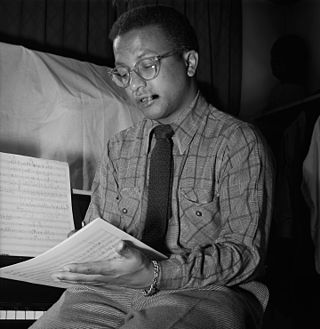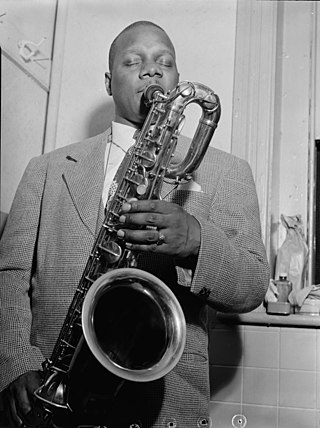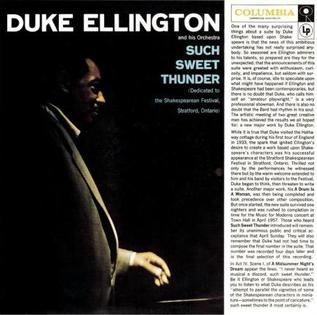
Edward Kennedy "Duke" Ellington was an American jazz pianist, composer, and leader of his eponymous jazz orchestra from 1923 through the rest of his life.

William Thomas Strayhorn was an American jazz composer, pianist, lyricist, and arranger, who collaborated with bandleader and composer Duke Ellington for nearly three decades. His compositions include "Take the 'A' Train", "Chelsea Bridge", "A Flower Is a Lovesome Thing", and "Lush Life".

Harry Howell Carney was a jazz saxophonist and clarinettist who spent over four decades as a member of the Duke Ellington Orchestra. He played a variety of instruments but primarily used the baritone saxophone, being a critical influence on the instrument in jazz.
"Take the 'A' Train" is a jazz standard by Billy Strayhorn that was the signature tune of the Duke Ellington orchestra.

Ella at Duke's Place is a 1965 studio album by Ella Fitzgerald and Duke Ellington, accompanied by his Orchestra. While it was the second studio album made by Fitzgerald and Ellington, following the 1957 song book recording, a live double album Ella and Duke at the Cote D'Azur was recorded in 1966. Ella at Duke’s Place was nominated for Best Female Pop Vocal Performance at the 1967 Grammy Awards.

Ella and Duke at the Cote D'Azur is a 1967 live album by Ella Fitzgerald, accompanied by the big band of Duke Ellington.

Take Love Easy is an album by the jazz singer Ella Fitzgerald with guitarist Joe Pass, released in 1974.

Ella Fitzgerald Sings the Duke Ellington Song Book is a 1957 studio album by the American jazz singer Ella Fitzgerald, accompanied by Duke Ellington and his orchestra, focusing on Ellington's songs.
"Lush Life" is a jazz standard that was written by Billy Strayhorn from 1933 to 1936. It was performed publicly for the first time by Strayhorn and vocalist Kay Davis with the Duke Ellington Orchestra at Carnegie Hall on November 13, 1948.
"Satin Doll" is a jazz standard written by Duke Ellington and Billy Strayhorn with lyrics by Johnny Mercer. Written in 1953, the song has been recorded by Ella Fitzgerald, 101 Strings, Terry Callier, and Nancy Wilson. Its chord progression is well known for its unusual use of chords and opening with a ii-V-I turnaround.
"Things Ain't What They Used to Be" is a 1942 jazz standard with music by Mercer Ellington and lyrics by Ted Persons.

Such Sweet Thunder is a Duke Ellington album, released in 1957. The record is a twelve-part suite based on the work of William Shakespeare.
"Rocks in My Bed" is a 1941 song written by Duke Ellington.
"Day Dream" is a jazz standard composed by Billy Strayhorn with lyrics by John Latouche and written in 1939. It was first recorded by saxophonist Johnny Hodges and his ensemble on November 2, 1940. Duke Ellington was credited as co-composer on the label of the original 78 RPM release, though he is not generally considered to be one of the song's creators.

"Chelsea Bridge" (1941) is an impressionistic jazz standard composed by Billy Strayhorn.

The Greatest Jazz Concert in the World is a 1967 live album featuring Duke Ellington and his orchestra, Ella Fitzgerald, Oscar Peterson, T-Bone Walker, Coleman Hawkins, Clark Terry and Zoot Sims. It was released in 1975.

Something to Live For: A Billy Strayhorn Songbook is an album by the pianist John Hicks, recorded in 1997 and released on the HighNote label. The album contains ten compositions by Billy Strayhorn, along with two by Hicks.

The Tommy Flanagan Tokyo Recital is an album by jazz pianist Tommy Flanagan. It is a trio album, recorded in 1975, with bassist Keter Betts and drummer Bobby Durham.











